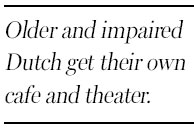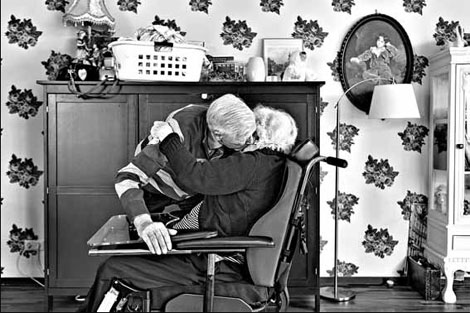Taking on dementia in a familiar setting
|
Elderly residents with dementia are confined to Hogewey, in the Netherlands, but can roam the complex. Theo Visser with his wife, Corrie, a patient. Pavel Prokopchik for The New York Times |
Weesp Journal
WEESP, the Netherlands - The 23-unit Hogewey complex here resembles other residential developments in the area. The apartments open onto a courtyard with benches, ponds and fountains, with beds of flowers. One kidney-shaped pond planted with reeds and other vegetation occasionally attracts wild ducks.
There are plenty of amenities: a small supermarket, a theater, and a restaurant and cafe that attract people from around the area. The residents can also participate in a variety of activities, like clubs for music, baking, painting and gardening.
Yet, if Hogewey does not sound all that different from a typical residential complex, that is the point. The 152 residents are older people suffering from severe dementia, but instead of being constrained in a typical nursing home, they live here for $6,555 a month, six to eight to an apartment, where they are cared for by two or more trained professionals.
The residents are confined to Hogewey for their safety. But within the complex they are allowed to move around freely, to the extent that they are able. On a recent afternoon, the residents of one apartment, designated as "urban" to reflect its residents' tastes, gathered in a dining room.
"Sometimes we shop, sometimes we listen to classical music," Jo Verhoef said. "My father liked classical music. My father was the music man."
Theo Visser's wife, Corrie, who uses a wheelchair, does not speak, but she enjoys the company. "Now, there's more togetherness," said Mr. Visser, 81.
The idea behind Hogewey developed over the last 20 years. But it was only after the new quarters were built in 2009 that it began attracting attention as a humane and cost-effective response to a disease that is claiming an increasing number of victims as life expectancies in the developed world rise.

In a report released last month, the World Health Organization forecast that the number of people suffering from dementia would double by 2030, to more than 65 million, and triple by 2050, as the world's population ages.
Jannette Spiering, the director of Hogewey, began working with dementia patients in a conventional high-rise. She and her colleagues came to feel that their patients would suffer less stress if they were in more familiar surroundings and kept as active as possible.
So they began creating living spaces and dining areas with mobile kitchens so that the patients, living together in small groups, might experience a normal household.
When the home's operator, a government-owned nursing home group called Vivium, decided to build new facilities, the design reflected those changes.
Dr. Anneke van der Plaats, a geriatrician and adviser to Hogewey, likes the way residents are urged to help with the cooking, with the laundry or with one another. "If you are demented, it is great if you can help other people," she said. "A demented person doesn't have to sit alone."
The New York Times



















